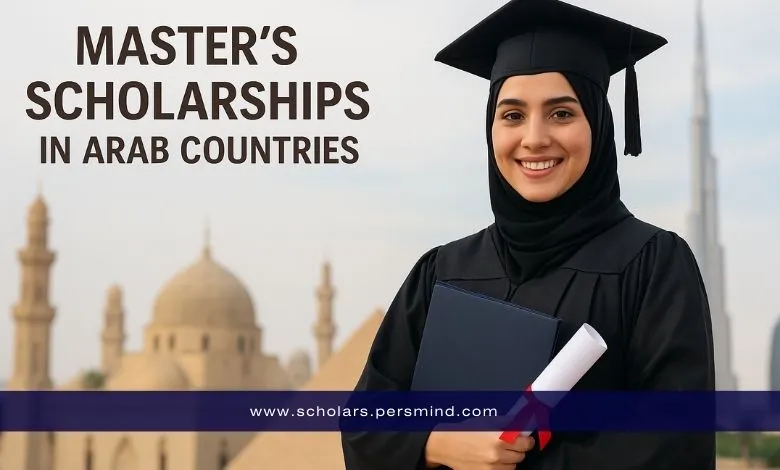Master’s Scholarships in Arab Countries: Your Practical Guide for 2025
Last updated: 25 October 2025
If you are aiming for a master’s degree with strong funding in an Arab environment that is close to you culturally and linguistically, Arab countries have become a smart option thanks to unified government platforms, advanced research universities, and generous funding programs—especially in engineering, artificial intelligence, and applied sciences. This article brings the landscape together for you in a practical way: where master’s scholarships are available, what they look like, and how to plan your application step by step.
Important: there is no such thing as a “100% guaranteed scholarship.” Admission depends on the strength of your profile (GPA, recommendations, experience, motivation letter, language).
How Do You Compare Offers Between Countries?
Language of instruction and language requirements: English/Arabic? IELTS/TOEFL or exemptions?
Amount of funding: Tuition waiver only, or (tuition + monthly stipend + housing + insurance + tickets)?
Academic and research value: Labs, industrial partnerships, rankings.
Cost of living and visa: Does the stipend cover living expenses? Are procedures clear?
Personal fit: Climate, culture, post-graduation opportunities.
Master’s Scholarships in Arab Countries
1: Saudi Arabia – Strong Funding System and Advanced Research Programs
Why Saudi Arabia for the master’s level?
World-class research universities and generous funding for master’s programs—especially in STEM and basic sciences.
Clear admission systems and official websites that provide details on funding and benefits.
Notable examples for master’s students
KAUST (King Abdullah University of Science and Technology): The admissions and funding pages state that all admitted master’s students receive a fully funded fellowship that covers tuition, housing, insurance, and logistical support, in addition to a monthly stipend detailed on the tuition and funding page.
KFUPM (King Fahd University of Petroleum and Minerals): The scholarship pages show benefits for graduate students, including a monthly stipend, on-campus housing, medical care, and tuition waiver, with funding opportunities for research conferences.
Who is it suitable for?
For students targeting advanced research in engineering, computer science, mathematics, energy, and materials, and who want a full fellowship that eases living expenses.
2: Qatar – Master’s Scholarships with Clear Portals and Published Timelines
Why Qatar?
Qatar University offers a range of competitive scholarships for graduate students—with official pages that explain the types, criteria, and timelines.
There are complementary national initiatives such as Qatar Scholarships, which support international students through agreements and partnerships.
Form of funding
It varies depending on the type of scholarship and the college, but often starts from tuition exemption and may include additional benefits depending on the program.
Who is it suitable for?
For students in management, engineering, and social sciences who are looking for a major public university with clear application portals and instructions.
3: United Arab Emirates – Full Master’s Scholarships in Future-Focused Fields
Why the UAE for the master’s level?
Universities focused on artificial intelligence, data science, and engineering with industrial partnerships and generous funding.
Examples of funded master’s programs
MBZUAI (Mohamed bin Zayed University of Artificial Intelligence): The official graduate admissions page states that full-time admitted students receive a full scholarship (100% tuition) with a monthly stipend, visa, and health insurance.
Khalifa University: Offers merit-based graduate scholarships, including research/teaching assistantships for master’s students, with eligibility assessed within the admission process.
You may also be interested in the Al Ain University Scholarship in the UAE.
Who is it suitable for?
For those interested in AI/ML/NLP/computer vision and applied research, or engineering programs linked to industry.
Students studying in master’s scholarship programs in Arab countries 2025 – fully funded graduate study opportunities at leading Arab universities.
Other Countries Offering Notable Opportunities for the Master’s Level
Jordan: Regionally strong universities, especially in medicine and engineering, with limited but significant scholarships.
Egypt: Wide variety of programs and reasonable living costs, which makes partial scholarships practical.
Morocco and Tunisia: Multilingual environment (Arabic/French/English) and annual exchange programs and scholarships according to agreements.
Quick Comparison
Most generous funding for master’s applicants: Saudi Arabia, UAE (depending on program).
Clearest application portals: Qatar University (timelines and FAQ pages), KAUST/KFUPM (clear details of benefits), MBZUAI (scholarship terms included in admissions).
Future-focused fields: UAE (MBZUAI) and Saudi Arabia (KAUST/KFUPM).
Generally lower living costs: Egypt/Tunisia/Morocco (depending on the city—research before deciding).
How to Apply for a Fully Funded Master’s Program?
Choose the program: Read the course descriptions, learning outcomes, and faculty profiles.
Check eligibility: GPA, language of instruction, and requirements (academic transcript, passport, CV, recommendations).
Prepare a strong application file:
CV of 1–2 pages with measurable achievements.
Motivation letter that links your research goals to the university’s/laboratory’s lines of work.
2–3 academic recommendation letters that reflect concrete accomplishments.
Language: IELTS/TOEFL or an exemption according to the university (read the official page for each program).
Online application: Use clear file names (Lastname_Program_2026.pdf) and clean PDF files.
Follow up: Monitor your email and respond quickly to inquiries/interviews.
After admission: Send visa and housing documents according to the deadlines, and plan to arrive before classes start.
Frequently Asked Questions (FAQ)
Are scholarships always fully funded?
No; some are tuition waivers only, and others are full funding (tuition + stipend + housing + insurance + tickets). Check the universities’ official pages for details.
Do I absolutely need IELTS?
It depends on the language of the program and the college’s policy. Some programs offer exemptions or alternatives. Check the admissions page for that specific program.
Does the visa allow part-time work?
This varies by country and visa type; review regulations before relying on side income.
When should I start?
It is preferable to start 9–12 months before the start of studies; some universities publish precise timelines for applications and scholarships.
Official External Links
KAUST – Master’s tuition and funding (comprehensive breakdown of fellowship components)
Qatar University – Scholarships page (types, eligibility, timelines)
MBZUAI – Graduate admissions process and full scholarships
Note: Conditions and benefits may change; the final reference is always the official university pages.
Conclusion
If your goal is a funded master’s degree in an Arab environment:
Saudi Arabia offers full fellowships and strong research infrastructure (KAUST/KFUPM).
Qatar provides scholarships with clear portals and published timelines (Qatar University).
The UAE shines in future-focused fields with full scholarships (MBZUAI) and other research universities (Khalifa University).
And with good planning and a strong profile, partial scholarships in Egypt/Morocco/Tunisia can become financially workable.
Start now by reading the three official links above, choosing your program, and working on your application file early.




0 Comments